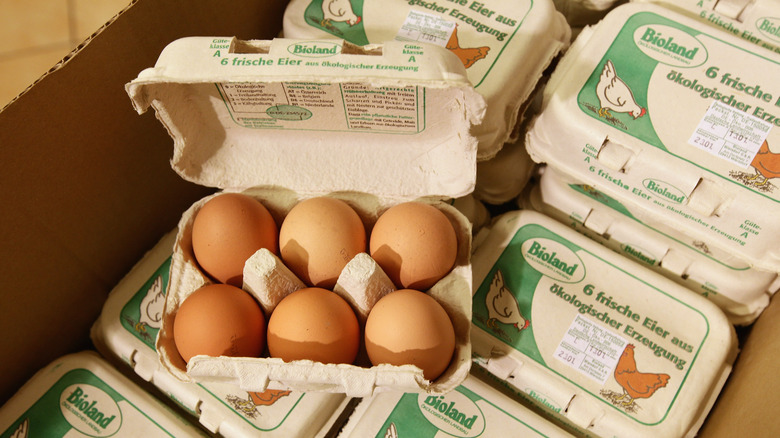Here's Why People Outside The US Don't Refrigerate Eggs
If you recently returned from your European summer, or have been living vicariously through others on your Instagram feed, you might've noticed some differences between life abroad and life at home. Yes, there's the romantic architecture, breathtaking landscapes, winding streets, and fabulous accents, but if you ever make your way into a grocery store such as Morrison's, there's one item that will seem out of place to those from the U.S. — the eggs.
When shopping for eggs in America, you're probably used to making your way to the refrigerated section. Within the frosted glass doors or placed upon cold shelves, you'll find the eggs sold by the dozen and half dozen somewhere nearby the dairy milk and cheese. But, when in Europe, or anywhere outside the border, it can be a bit surprising to see eggs sitting on shelves out in the open, with no refrigerator in sight.
No need to worry — those room-temp eggs are perfectly safe to eat, and there's a perfectly sensible explanation as to why.
Two solutions to the same problem
So, why do we refrigerate eggs in America? Well, as HuffPost explains, the law requires it. If you know anything about salmonella, the bacteria that WebMD says is behind the most food-borne illnesses in the U.S., you might know that before the 70s, it ran rampantly through chicken farms (via The Healthy). To keep the bacteria at bay, America's solution was to rinse the eggs before putting them in stores. However, not only would any bacteria on the eggs rinse away, their protective coatings would also go down the drain with them.
Without their cuticles, the eggs in the U.S. would need to be refrigerated, just as they are today. However, most places outside of the states took a different approach to combat salmonella. Instead of going through the trouble of rinsing every egg, they chose to go right to the source. By vaccinating their chickens and making it illegal for egg producers to wash eggs, they are able to keep the coatings of their eggs intact (via Forbes). This meant that keeping their eggs free of bacterial contamination would require no refrigeration.

